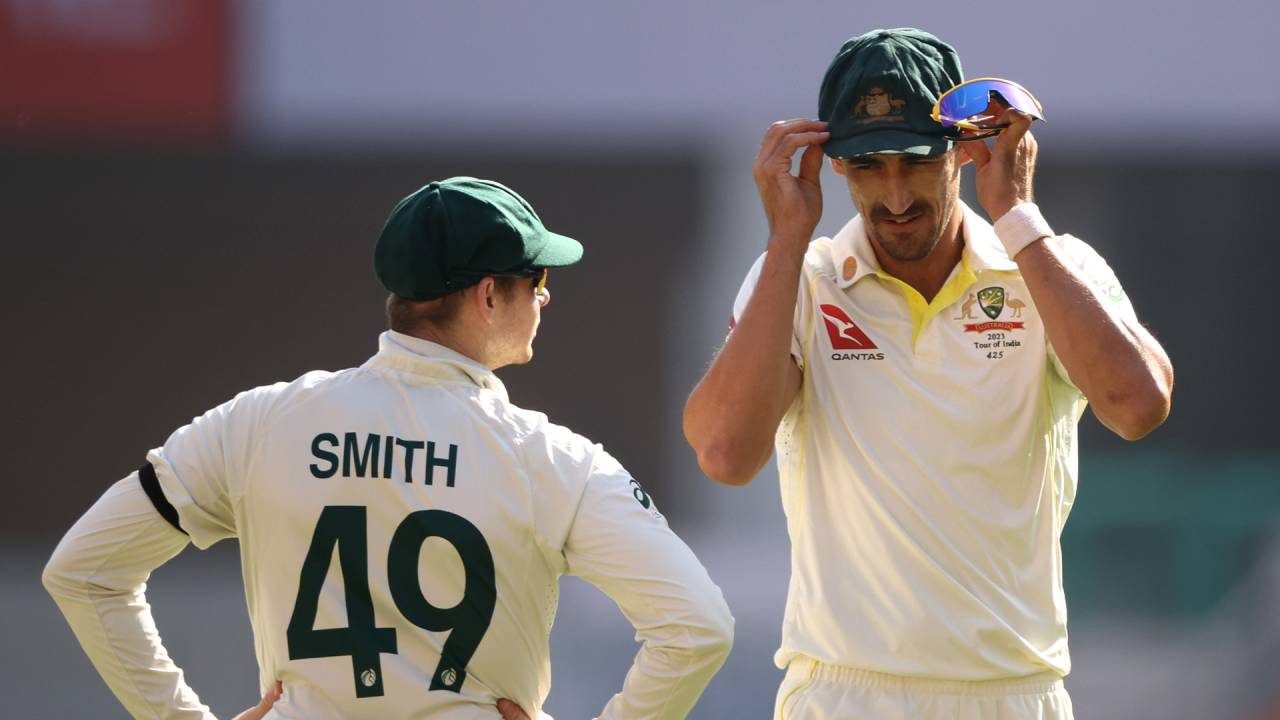With or without Khawaja, Australia face a 'big challenge' to save the series
They have held their tour together impressively but the last day promises to be a final challenge, potentially without one of their best batters
Andrew McGlashan
Mar 12, 2023, 2:06 PM
Usman Khawaja will be assessed ahead of the final day's play in Ahmedabad to determine how much of a role he is able to play after suffering an injury to his left leg with Australia facing a fight to save the game.
Khawaja appeared to jar his left knee attempting to take a boundary catch offered by Axar Patel at the start of the 148th over with the problem described as a lower leg issue that would continue to be evaluated. He hobbled back around the boundary to the dressing room and did not reappear.
He was unable to open in the second innings due to the time spent off the field with Matt Kuhnemann handed the unexpected elevation as a nightwatcher. He successfully negotiated the day alongside Travis Head although was dropped by KS Bharat off R Ashwin's last delivery.
Regardless of how well Khawaja pulls up overnight it appears likely he will be impeded in some way should he be able to bat and runners are no longer allowed in international cricket. He made a superb 180 in the first innings and has been Australia's standout batter in the series with 333 runs at 47.57.
In 2014, Khawaja had to undergo reconstructive surgery on his left knee after tearing his left anterior cruciate ligament and in 2018 suffered a meniscal tear when he twisted the same knee during a warm-up fielding drill during Australia's Test series against Pakistan in the UAE. However, as of the close of play in Ahmedabad this injury was not specifically being related to his knee.
With or without Khawaja, Australia will need to dig deep after two long days in the field where centuries from Shubman Gill and Virat Kohli, alongside another valuable hand from Axar, built India a 91-run lead.
"It is going to be a big challenge obviously," Alex Carey said. "We will put a fair bit of focus on that first hour of cricket and then we'll see how that unfolds. Thought we did really well today minimise the lead."
After a number of years where Test cricket in India has generally been dominated by pitches in favour of the spinners, this match has reverted to another style: where a visiting team finds a large first-innings total isn't big enough. There are similarities to the 2016-17 Test in Ranchi where Australia made 451 only for that to be dwarfed by India's 603 which left them with a final-day battle for survival. They were able to achieve it through Shaun Marsh and Peter Handscomb.
"We wanted to score more than 480," Carey admitted. "Think the tail did a great job in finding us an extra 80-100 runs. Cameron Green's innings was great and he'll want to go bigger next time. Think anytime you post a decent score you put a bit of pressure back in the [opposition] changing room to then go big and some class players for India did that."

The Australians found some reasons to smile in the last session after a hot day in the middle•BCCI
In that Ranchi Test six years ago, Steve O'Keefe sent down 77 overs - the sixth-most in terms of balls bowled for an Australian spinner. This time it was the turn of Nathan Lyon to clock up the huge numbers as he hit 65, his most for a Test innings, narrowly overtaking the 64 he sent down in Galle last year. Both he and Todd Murphy, who continued to show outstanding control in his debut series, were never taken apart by India's batters.
It was another tough day for Australia's quicks with Mitchell Starc picking up their lone success when he speared one through Axar. Starc was used sparingly by Smith for just five overs on the fourth day. Cameron Green was expensive, getting taken for 21 off an over shortly after lunch when he briefly attempted to implement a short-ball plan to Bharat who repeatedly pulled him over the short leg-side boundary.
With Australia's bowling potentially done for the series, it won't be one their quicks will remember fondly. The combination of Starc, Green, Pat Cummins and Scott Boland have five wickets to show for their efforts. The pace-bowling average of 77.80 places it as the fourth-most expensive series for a cohort of Australian quicks. In comparison, India's quicks have taken their 13 wickets at 33.53.
After Green had completed what became his final spell, during which he had been dispatched for a brace of gorgeous boundaries by Kohli, Starc walked over to him on the outfield and offered a supportive arm around the shoulder. Many a bowler has had that treatment. After what happened in Delhi, Australia have held their tour together impressively, but the last day promises to be a final challenge and potentially without one of their best batters.
Andrew McGlashan is a deputy editor at ESPNcricinfo
